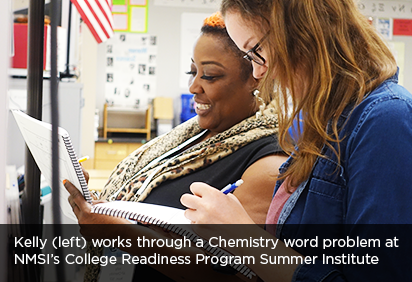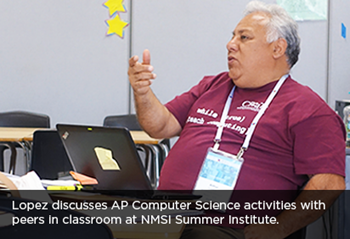Chicago Teacher: Students' Access to Rigorous Courses is a 'Choice' Teachers Make
Jessie Steenburg |
October 7, 2019
Only miles away from the beach during summer break, Chicago and California teachers entered NMSI’s training in San Diego with one thought at the forefront of their minds: how they can be the catalyst for increasing access to STEM in their schools.
 Kemba Kelly wasn’t always a teacher. For nearly a decade, she worked as a Senior Research Associate studying anesthetic toxicity at the University of Illinois at Chicago and the University of Chicago. During her career as a scientist and researcher, she recalls being the only black female, if not the only black person, in her department. While she was proud of her accomplishments as a scientist, she was bothered by the lack of cultural, racial and ethnic diversity in her field. So, Kelly looked to the next generation.
Kemba Kelly wasn’t always a teacher. For nearly a decade, she worked as a Senior Research Associate studying anesthetic toxicity at the University of Illinois at Chicago and the University of Chicago. During her career as a scientist and researcher, she recalls being the only black female, if not the only black person, in her department. While she was proud of her accomplishments as a scientist, she was bothered by the lack of cultural, racial and ethnic diversity in her field. So, Kelly looked to the next generation.
She returned to the neighborhood in which she grew up and became a teacher at Noble Schools, a college preparatory charter school network in Chicago. She hopes that if her students see a successful, female African American scientist from their community, they could see themselves as scientists, too.
Ensuring students have access to high-quality education is up to the teacher, Kelly shares. “Access is just a choice. [As teachers], we either give them access or we close off access.”
Art Lopez believes in the power of computer science. As an AP Computer Science teacher and Curriculum Specialist in Sweetwater Unified High School District in San Diego, Lopez sees the course as not only an essential skill in the 21st century, but also a tangible access point into more rigorous STEM courses. Because of that, he’s not driven by exam scores. He aims to make his course rigorous, engaging and confidence-building. If he can do that, he shares, then kids will want to come back for both computer science and additional advanced courses.
With equity and access in mind, Kelly and Lopez arrived at NMSI’s College Readiness Program Summer Institute ready to engage and improve their own content knowledge to benefit students.
In AP Chemistry, Kelly discovered new ways to anticipate student responses and utilize data to prepare multiple methods for explaining complex topics. She believes that if she recognizes the unique interests and abilities of each student, she can inspire a love of chemistry in her diverse student population.
 At the other end of the hallway, Lopez engaged in rich discussions with his peers in the AP Computer Science A classroom. Though he brings years of experience in computer science, this year will be his first time teaching the course. He looked to NMSI’s expert teacher for a deeper understanding of how to teach a “really abstract, difficult topic to kids.”
At the other end of the hallway, Lopez engaged in rich discussions with his peers in the AP Computer Science A classroom. Though he brings years of experience in computer science, this year will be his first time teaching the course. He looked to NMSI’s expert teacher for a deeper understanding of how to teach a “really abstract, difficult topic to kids.”
With these new tools and connections, Kelly and Lopez left energized and ready to share their learning with their colleagues at home. More importantly, they felt empowered to intentionally invite students that may not believe they fit the mold of a “typical AP student” to participate – with the assurance that their teachers have their back.
